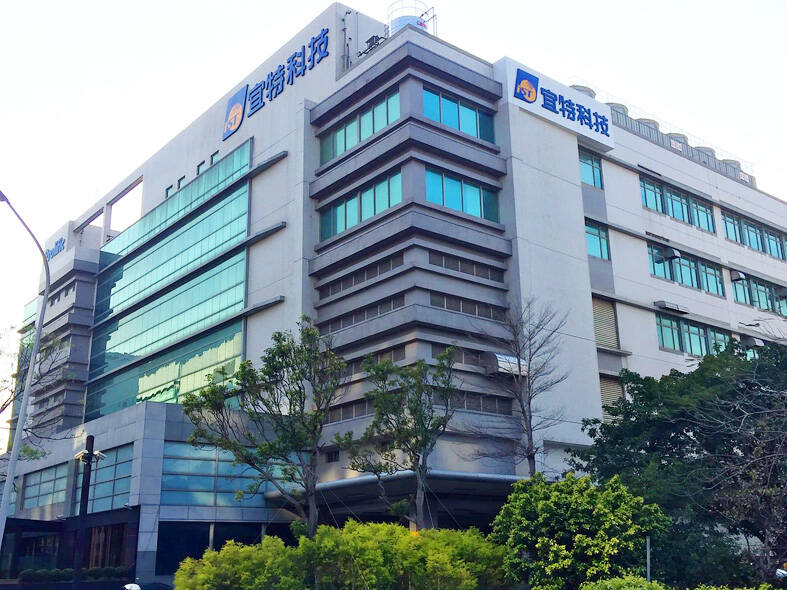Integrated Services Technology Inc (IST, 宜特科技), which provides semiconductor reliability testing, failure analysis and material analysis services, yesterday said that its net profit last quarter soared 65.39 percent annually, bucking a downtrend in the semiconductor industry.
The company expects the growth momentum to carry into the second half of this year, as leading global electronic companies continue to invest in developing generative artificial intelligence (AI) chips.
Chipmakers are also refocusing their research efforts into developing automotive chips, including display chips, ethernet chips and bluetooth chips, to diversify from chips used in consumer electronics, IST said.

Photo: Grace Hung, Taipei Times
The company remains optimistic, despite industry forecasts that the semiconductor inventory correction might extend into this quarter and smartphone demand remains in the doldrums, according to the statement.
Net profit rose to NT$151.27 million (US$4.87 million) during the quarter ending on June 30, compared with NT$91.47 million in the second quarter last year, marking its best second-quarter performance.
On a quarterly basis, net profit jumped 54.43 percent from NT$97.96 million.
Earnings per share (EPS) expanded to NT$2.02 last quarter from NT$1.22 a year earlier and from NT$1.31 a quarter earlier. Last quarter’s EPS was the best in about 13 quarters, it said.
The company attributed the robust growth to demand for material analysis, failure analysis, and reliability analysis for automotive and AI chips, IST said.
Growth in those areas helped offset weakness in demand for chips used in consumer electronics and excess inventory, it said.
Gross margin improved to 28.41 percent last quarter from 26.16 percent in the same period last year. On a quarterly basis, gross margin moderated slightly from 28.49 percent in the first quarter.
Revenue last quarter rose 6.81 percent year-on-year to NT$973.05 million from NT$910.98 million. That was a quarterly decline of 0.84 percent compared with NT$981.32 million.
About half of the company’s revenue came from offering reliability test services.

Taiwan Semiconductor Manufacturing Co (TSMC, 台積電) would not produce its most advanced technologies in the US next year, Minister of Economic Affairs J.W. Kuo (郭智輝) said yesterday. Kuo made the comment during an appearance at the legislature, hours after the chipmaker announced that it would invest an additional US$100 billion to expand its manufacturing operations in the US. Asked by Taiwan People’s Party Legislator-at-large Chang Chi-kai (張啟楷) if TSMC would allow its most advanced technologies, the yet-to-be-released 2-nanometer and 1.6-nanometer processes, to go to the US in the near term, Kuo denied it. TSMC recently opened its first US factory, which produces 4-nanometer

PROTECTION: The investigation, which takes aim at exporters such as Canada, Germany and Brazil, came days after Trump unveiled tariff hikes on steel and aluminum products US President Donald Trump on Saturday ordered a probe into potential tariffs on lumber imports — a move threatening to stoke trade tensions — while also pushing for a domestic supply boost. Trump signed an executive order instructing US Secretary of Commerce Howard Lutnick to begin an investigation “to determine the effects on the national security of imports of timber, lumber and their derivative products.” The study might result in new tariffs being imposed, which would pile on top of existing levies. The investigation takes aim at exporters like Canada, Germany and Brazil, with White House officials earlier accusing these economies of

Teleperformance SE, the largest call-center operator in the world, is rolling out an artificial intelligence (AI) system that softens English-speaking Indian workers’ accents in real time in a move the company claims would make them more understandable. The technology, called accent translation, coupled with background noise cancelation, is being deployed in call centers in India, where workers provide customer support to some of Teleperformance’s international clients. The company provides outsourced customer support and content moderation to global companies including Apple Inc, ByteDance Ltd’s (字節跳動) TikTok and Samsung Electronics Co Ltd. “When you have an Indian agent on the line, sometimes it’s hard

GREAT SUCCESS: Republican Senator Todd Young expressed surprise at Trump’s comments and said he expects the administration to keep the program running US lawmakers who helped secure billions of dollars in subsidies for domestic semiconductor manufacturing rejected US President Donald Trump’s call to revoke the 2022 CHIPS and Science Act, signaling that any repeal effort in the US Congress would fall short. US Senate Minority Leader Chuck Schumer, who negotiated the law, on Wednesday said that Trump’s demand would fail, while a top Republican proponent, US Senator Todd Young, expressed surprise at the president’s comments and said he expects the administration to keep the program running. The CHIPS Act is “essential for America leading the world in tech, leading the world in AI [artificial